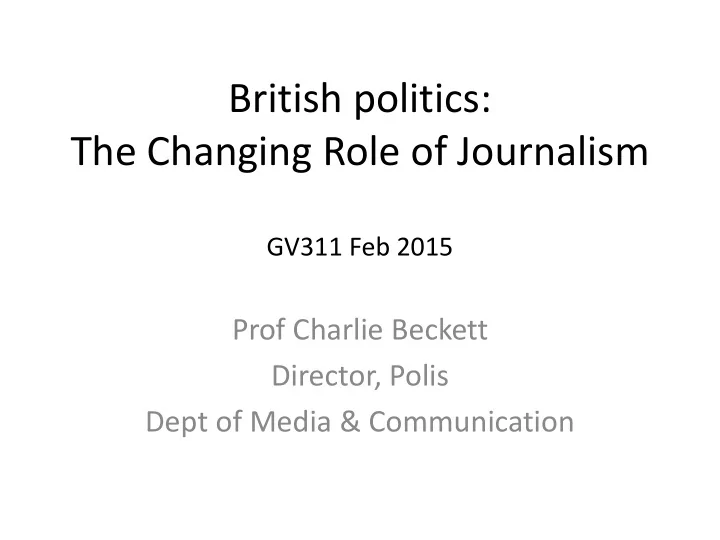

British politics: The Changing Role of Journalism GV311 Feb 2015 Prof Charlie Beckett Director, Polis Dept of Media & Communication
• What is the structural role of journalism in UK politics and how well does it perform? • How is political journalism changing? • What impact might that have on democracy?
How did this….
…lead to this?
It was mainly this
Plus a lot of this
Though it wouldn’t work without this
Unique or a precedent? • Rochester by-election – damage limitation • Over-reaction by over-sensitive leader • Inevitable consequence of febrile networked political media (and polling day media vacuum) • Toxic combination of anti-Labour blogger (who works for) and anti-Labour newspaper • Genuine problem with core vote perception of aloof politicians and out of touch Labour elite
What does journalism do for politics? • Information [facts, records, statistics, events, policies] • Deliberation [debate, analysis, comment, opinion] • Accountability [investigation, audit, voice for citizen, campaigns]
History of news: a battle between press & power
History of news: a battle between press & power • Inns of court: state PR • Holborn printers – licensed press • Covent Garden coffee houses – paid hacks • Reporting parliament – a controlled Lobby • Broadcasting – public and commercial – all regulated • Internet & social media – call for controls
The problem with political journalism is..?
The (politician’s) problem with political journalism is..? • Unaccountable power • Bias • Obsession with process • Cynicism • Lack of information • Lack of expertise • Loss of local press
The (journalist’s) problem with political journalism is..? • Lack of resources for (political) journalism • Government secrecy • Government and party spin and manipulation • Disintermediation: increased role of social networks & public relations
The (public’s) problem with political journalism is..? • Too complicated • Too simplistic • Too cynical • Not critical enough • Too belligerent, biased • Too complicit – not critical or radical enough • Too much process • Sensationalist • Boring • Not informed enough about • Irrelevant – ‘Westminster realities of policy-making bubble’
Press power?
PR power?
Triumph of spin?
LoL
Leveson’s verdict • Politicians “developed too close a relationship with the Press in a way which has not been in the public interest’ • Regular political journalism was "in robust good health and performing the vital public interest functions in a vigorous democracy,"
Networked Journalism
non-political political fora
• General Election TV Debate
Structural change: Mixed media – but all networked • Traditional ‘ legacy’media • Social news media • Social networks
Politicians News Media Public
Political reporting is now networked Citizens Politicians Media
Redefine ‘ Journalist ’ • Curator • Partner • Social networker • Specialist
Redefine ‘ News ’ • (Open) Data • Transient ‘liquid’ reality • Relationship not authority • Contested not objective
What difference does it make? • Influence – who has it? • Proportionality – a fair voice? • Verification – what’s true? • Acceleration – faster, instant, all the time • Destabilisation – surprise, ambush, reveal • Superficiality – attention & distraction • Fragmentation or diversity?
Filter bubbles?
Filter bubbles?
Distraction? • 1968 average TV soundbite 43” • 1988 average TV soundbite 9” • 1892 average newspaper quote 1.7 column inches • 1916 average newspaper quote 1.0 column inch
Distraction?
A challenge to politicians
Challenge to journalists
Real problem is engagement, attention & authenticity
How to get people’s attention
@CharlieBeckett Prof Charlie Beckett Director, Polis Dept of Media & Communication
Recommend
More recommend